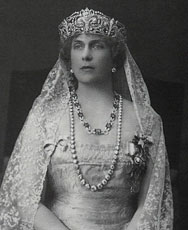Golden Casket - Fleur de Lis
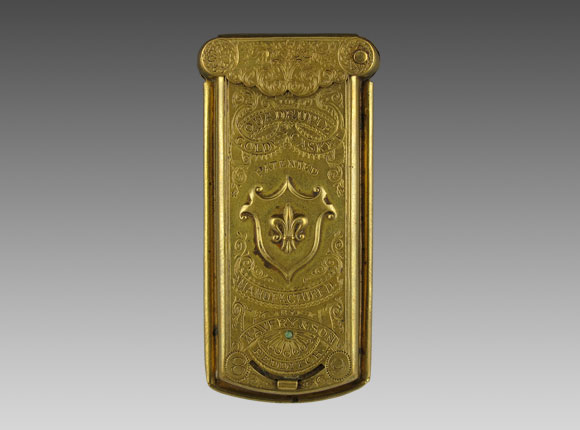
Needle Case
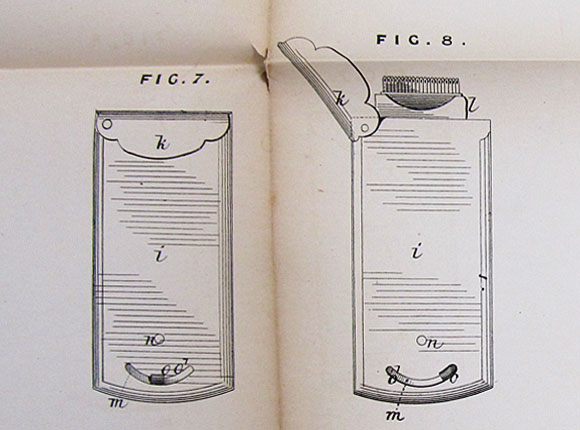
UK Patent 1868-3517 drawing
Design Details
Needle Case Type: |
Quadruple |
Patent/Registered to: |
William Avery, Redditch Needle Manufacturer and Albert Fenton of the same place, Machinist |
Patent/Design Representation #: |
Mechanical Patent: #3517 |
Patent/Design Registration Date: |
November 19, 1868 |
Location of Patent/Design Registration: |
British Library - Business and Intellectual Property Centre – London |
Reference #: |
1868-3517, Figures 7-10 |
Dimensions: |
3.3 x 7 |
Material: |
Brass |
Name Variations: |
a) Asser & Sherwin - London
b) W. Avery & Son - Redditch
c) T. G. G. Brent - London
d) Cormack Bros - London
e) Hayes, Crossley & Co - London and Alcester
f) T. & J. Holyoake - Redditch
g) Ellis, Howell & Co - London
h) Hutton & Co - London
i) Mappin & Webb - London & Sheffield
j) G. & J. Morton - Cutler - Cheapside
k) J. & G. Morton - Culter - Cheapside
l) Perry & Co - London
m) Charles Schleicher - Belle Vallee
n) W. Whiteley - Westbourne Grove, London
o) Vyse, Sons & Co - London |
Other Variations: |
With rectangular slider
With ball slider
Nickel-silver version
See other Quadruples |
US Patent |
US 1870-98904 |
Additional Photographs
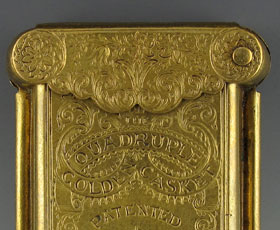
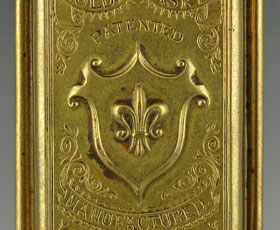
Detail views
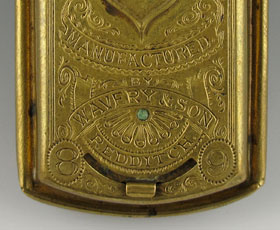
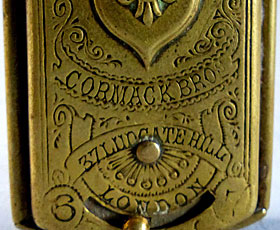
Avery signature detail with rectangular slider and Cormack signature detail (photo from eBay)
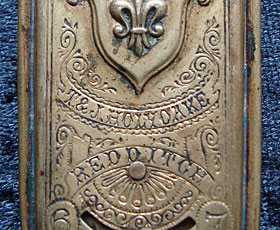
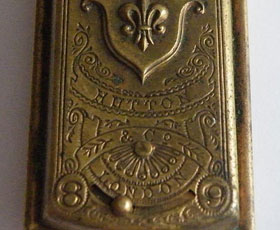
Holyoake signature detail and Hutton signature detail (photos from eBay) both with ball sliders
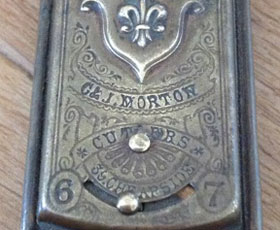
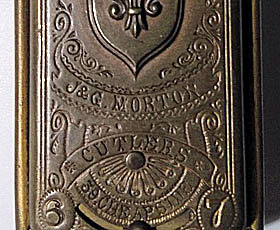
G. & J. Morton signature detail (photo from eBay) and J. & G. Morton signature detail (photo from Internet)
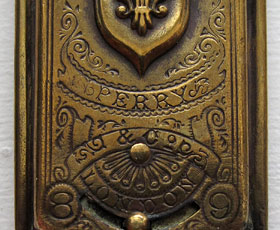
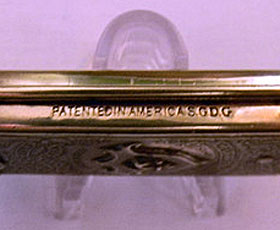
Perry & Co signature detail (photo courtesy of Brooks Popowitch) and version with side marked "Patented in America S.G.D.G" (photo from eBay)
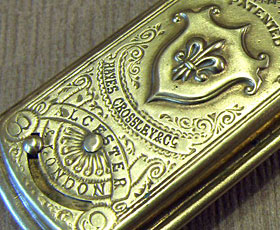
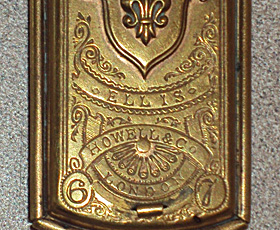
Hayes, Crossley & Co signature detail and Ellis, Howell & Co London signature detail (photos from eBay)
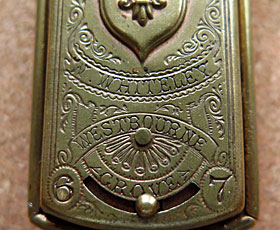
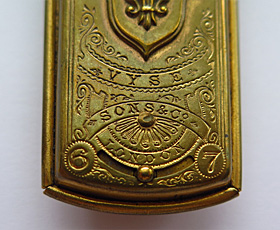
Whiteley signature detail (photo from eBay) and Vsye signature detail
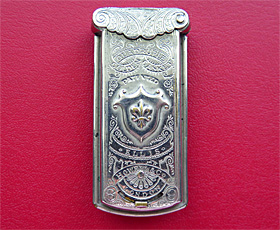
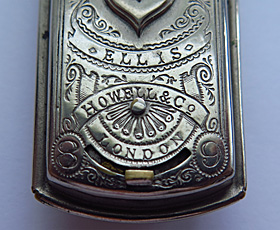
Nickel-silver version with Ellis Howell signature detail
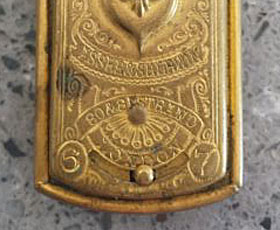
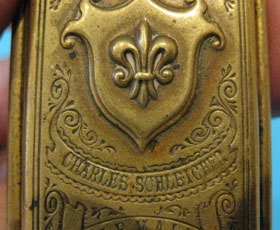
Asser signature detail (photo from eBay) and Schleicher signature detail
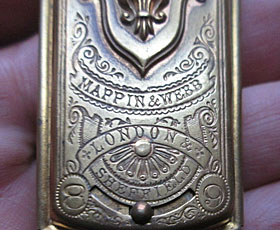
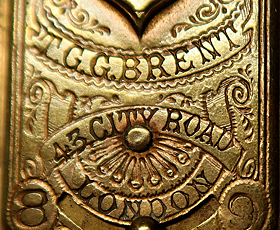
Mappin & Webb signature detail (photo from eBay) and T. G. G. Brent signature detail
Facts
A fleur-de-lis is a stylized lily or iris with three pedals bound together at the base. When translated from the French it means “flower of
the lily”. It is a decorative element originally connected to royalty and religion, however today it is often used for its aesthetic beauty.
Although the fleur-de-lis is found on many European coat of arms and flags, it is best known as the symbol of France.

History
The earliest examples of the fleur-de-lis were discovered in Mesopotamia on Assyrian sculpture dating to the 3rd millennium BC. They were
also found on cylinder seals, jewelry, coins and other items linked with royalty in the ancient cultures of Egypt, Greece, Rome and Gaul
(northwestern Europe). During the Middle Ages the fleur-de-lis became the symbol of the Christian trinity. The first fleur-de-lis
associated with French nobility appeared during the reign of Louis VIII in 1230 AD and is found in a stained glass window in the Gothic
cathedral at Chartres. Some historians believe the three fleurs-de-lis on the French King’s coat of arms signifies the medieval social
classes: the workers, the warriors and the clergy.
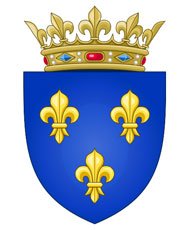
Miscellaneous
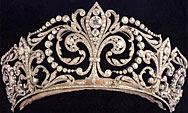
Victoria Eugenie of Battenberg (1887-1969) was the granddaughter of Queen Victorian and the daughter of Princess Beatrice. She married
King Alfonso XIII of Spain in 1906. As a wedding gift, the groom presented his bride with the diamond tiara pictured here. Encrusted
with over 500 diamonds set in platinum, it features a fleur-de-lis in the center. Victoria Eugenie wore it frequently during her reign as
the Queen of Spain.
